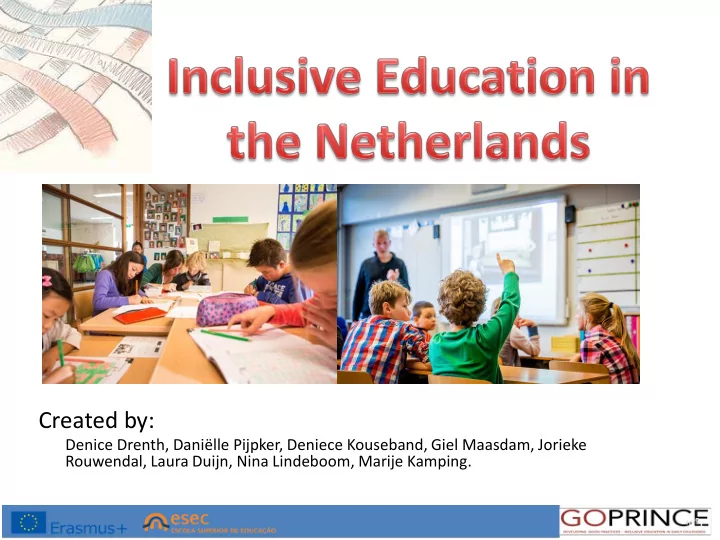

Created by: Denice Drenth, Daniëlle Pijpker, Deniece Kouseband, Giel Maasdam, Jorieke Rouwendal, Laura Duijn, Nina Lindeboom, Marije Kamping. 1
Inclusive Education Education system Preschool Primary school group 1&2 (age 4-6) Primary school group 3/4/5 (age 6-9) Primary school group 6/7/8 (age 10-12) Cluster schools Our education system Movie 2
Website of the Dutch government: the premise of Inclusive Education: ‘All pupils should get a place at a school that suits their qualities and possibilities’ Main goal: ‘to challenge each child to get the best out of themselves’
Five goals that the Government wants to achieve: 1. All pupils -> appropriate place in education. 2. Regular school or school for special education. 3. Schools -> more opportunities for customizes support. 4. Possibilities and educational needs of child decisive. 5. Children -> not stuck at home long-term.
Duty of care: three possibilities: 1. Offer on private school. 2. Offer on another regular school. 3. Offer at school for special education. Next sheets: apply Inclusive Education in primary schools. 5
6
Childcare Children aged 0 – 4 years Groups of 16 children Working parents Playgroup Children aged 2 – 4 years 1 to 4 day parts a week Goal is to let children play not raise 7
Preschool education Pre school education for children with a lower level or a language delay Children 2 – 6 years Special methods: Piramide, Kaleidescoop 8
For children age 0 to 7 years Developmental problems A team of different experts examines and treats the child Different help for each child 9
Kindergarten May go to school at the age of 4 Must go to school at the age of 5 Grade 1/2 – groep 1/2 Playful learning
Circle Singing Dailey programme Reading Theme learning - Math - Vocabulary
Corners Housing corner Building corner Painting corner Computer corner Theme corner
Learning the Alphabet At least 20 letters Recognizing and using verbal
Inclusive education kindergarten Parents can choose which school they prefer. - Regular education - Special education The school needs to make a schedule for the individual student.
Method: Piramide Extra exercises and a individual workbook. From the arrear child to the gifted ones.
A regular school day in the Netherlands; school starts at 8:30 AM and ends at 15:15 AM. At Wednesday and Friday school ends at 12:15 AM. At 10:00 AM children have a short “fruit” break and play outside for a while. 12:00 – 13:00 AM children go home to eat bread. 16
Learning the basic skills: Read Write Spell Count
All pupils work towards the same core objectives, some will need extra help. For example this children need extra help: Childeren with an extreme lower or higher intelligence level Children with autism Children with ADHD Children with down syndrome 18
What help can be provided for example Help with reading or counting Help with speaking; speech therapist 19
Subjects Math 123 Reading Dutch language ABC The man |is |going |to | the supermarket. 20
Subjects: Geography History Nature English language Religion Traffic First aid 21
The teacher makes together whit the extra help and his/her class possible for disabled children to study like normal children 22
And get the extra help they need 23
For children with disabilities, chronic illness or disorder. More attention and support. Because: the school has smaller groups and more experts . Regular eduction Special eduction
Cluster 1: blind, visually impaired children. Cluster 2: deaf, hearing-impaired children. -communication problems -Autism Cluster 3: disabled and chronically ill children. -long-term sick -Epilepsy Cluster 4: children with behavioral disorders and problems.
26
- Students dean - Motor or fysical disabilities - Adapted study program - Sensory disability - Extra examtime - Chronic disease - Financial measures - ADHD - Wheelchair - Dyslexia facilities - Autism 27
28
Recommend
More recommend